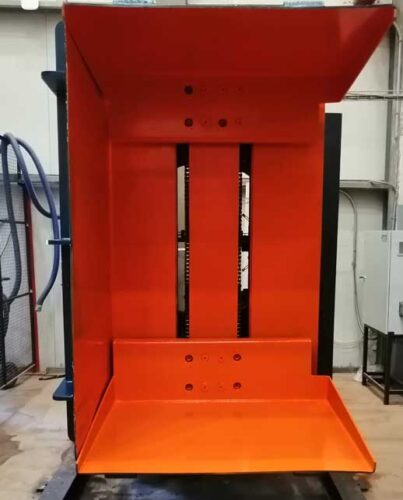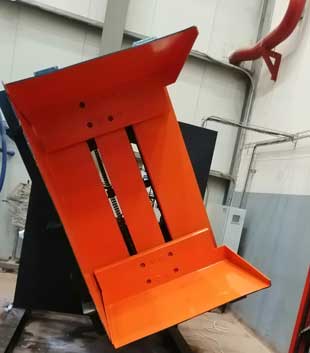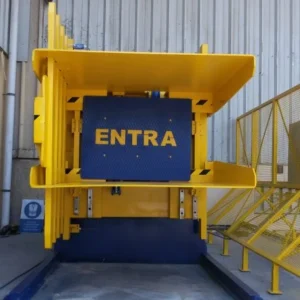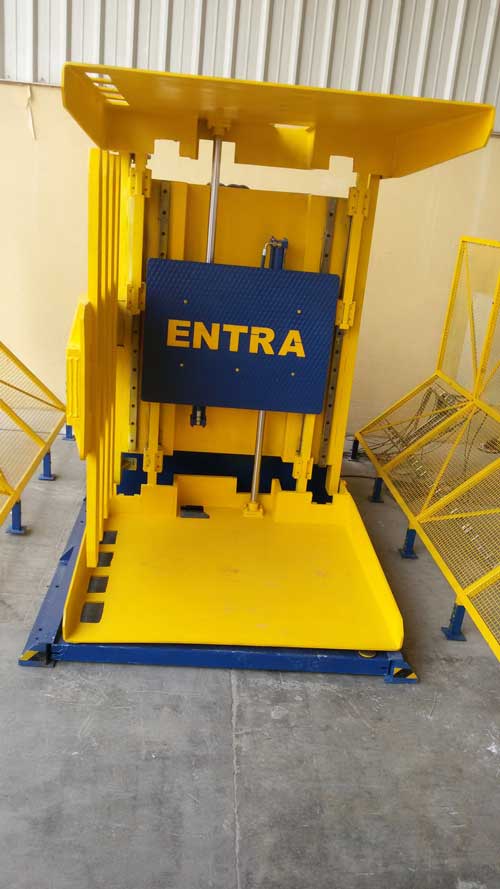The Ultimate Guide to Industrial Pallet Inverters: Revolutionizing Material Handling
A pallet inverter machine is a specialized piece of equipment designed to safely and efficiently flip or rotate pallets, allowing for the easy handling and manipulation of loaded pallets in various industrial and commercial settings. These machines are an integral part of material handling operations, streamlining processes and improving efficiency.
-

- Pallet Inverter-Nestle Factory
-

- Pallet Inverter-Nestle Factory
-

- Pallet Inverter-Nestle Factory
Types of Pallet Inverters
Pallet Inverter
Pallet Inverter
Pallet Inverter
Pallet Inverter
ENTRA Offers wide range of conveyors suitable for pallet inverter service and backup
Check out our conveyor systems below

Semi-Automatic Pallet Inverters
- Semi-automatic pallet inverters require some level of manual intervention during the inversion process

Typically, an operator will load the pallet onto the machine and initiate the inversion sequence. These inverters are ideal for facilities with varying pallet sizes or loads, providing flexibility and control over the process
Key Benefits of Using Pallet Inverters
- Increased Efficiency and Productivity By automating the process of pallet inversion, industrial pallet inverters significantly reduce the time and labor required for manual handling. This increased efficiency translates to higher productivity, allowing facilities to process more pallets in a shorter timeframe, ultimately improving overall throughput and profitability.
- Improved Safety and Ergonomics Manual pallet handling can be physically demanding and pose significant risks of injuries, such as back strain or crush-related accidents. Pallet inverters eliminate the need for workers to lift or manually rotate heavy loads, significantly reducing the risk of workplace injuries and improving ergonomics.
- Space Optimization Efficient pallet handling allows for better space utilization within warehouses, distribution centers, and manufacturing facilities. By streamlining the inversion process, pallet inverters enable more organized and compact storage solutions, maximizing available floor space and enhancing overall operational efficiency.
Applications of Pallet Inverters
Warehouses and Distribution Centers Warehouses and distribution centers are prime locations for the implementation of pallet inverters. These facilities often handle large volumes of palletized goods, and efficient pallet management is crucial for maintaining smooth operations. Pallet inverters facilitate tasks such as cross-docking, putaway, and order fulfillment, improving the overall flow of goods.
Manufacturing Facilities In manufacturing environments, pallet inverters play a critical role in streamlining production processes. From receiving raw materials to shipping finished products, pallet inverters ensure safe and efficient handling of palletized goods, minimizing downtime and supporting lean manufacturing principles.
Logistics and Transportation The logistics and transportation industry relies heavily on palletized cargo. Pallet inverters are essential tools for loading and unloading trucks, containers, and other modes of transport. By ensuring proper pallet orientation, these machines facilitate safe and efficient cargo handling, reducing the risk of damage and delays.
Factors to Consider When Choosing a Pallet Inverter
Load Capacity and Weight Handling
One of the primary considerations when selecting a pallet inverter is its load capacity and weight-handling capabilities
It’s crucial to choose a machine that can safely and reliably handle the weights and dimensions of your palletized goods, ensuring smooth operations and avoiding potential accidents or equipment failures.
Check out Other Products Here>>>
Dimensions and Space Requirements
The physical dimensions of the pallet inverter, as well as the available space in your facility, are important factors to consider. Ensure that the inverter can accommodate your pallet sizes and that there is sufficient clearance for safe operation and material flow.
Automation Level and Control Systems
Determine the level of automation required for your operations. Semi-automatic pallet inverters may be suitable for smaller facilities or those with varying pallet sizes, while fully automatic systems are ideal for high-volume, streamlined operations. Additionally, consider the control systems and user interfaces for efficient operation and integration with existing workflows.
Frequently asked questions
-
What is the typical load capacity range for industrial pallet inverters? Industrial pallet
inverters are designed to handle a wide range of load capacities, typically ranging from lightweight loads of a few hundred pounds to heavy-duty loads of several tons. The specific load capacity depends on the model and manufacturer, so it's essential to select an inverter that can safely and reliably handle the weights of your palletized goods.
-
Can pallet inverters handle non-standard pallet sizes?
Yes, many pallet inverters are designed to accommodate a variety of pallet sizes and dimensions. Semi-automatic inverters, in particular, offer greater flexibility in handling non-standard pallet sizes. However, it's important to verify the specific size ranges and clearances with the manufacturer to ensure compatibility with your pallets.
-
How does a fully automatic pallet inverter work?
Fully automatic pallet inverters are highly automated systems that integrate seamlessly with existing material handling workflows. These inverters typically use sensors, conveyors, and automated controls to detect incoming pallets, position them correctly, and initiate the inversion process without manual intervention. The entire process is controlled and monitored by advanced control systems, ensuring efficient and consistent pallet handling.
-
How often should pallet inverters be serviced or maintained?
The frequency of maintenance and servicing for pallet inverters depends on various factors, such as usage levels, operating conditions, and manufacturer recommendations. As a general guideline, it's advisable to follow the manufacturer's recommended maintenance schedule, which typically includes regular inspections, lubrication, and replacement of worn components. Proper maintenance helps ensure optimal performance, extend the equipment's lifespan, and prevent costly breakdowns or downtime.
-
What are some common safety features found in pallet inverters?
Safety is a top priority when it comes to pallet inverters. Common safety features include emergency stop buttons, sensor systems for load detection and positioning, guarding mechanisms to prevent accidental contact with moving parts, and audible or visual warning signals. Additionally, many pallet inverters comply with industry safety standards and certifications, such as OSHA or CE requirements.
Request a Quote?
Are you ready to request a standard model? We have many pallet inverter types to offer. Fast shipping is available on some ‘quick ship’ models.
Contact Us
We would love to speak with you.
Feel free to reach out using the below details.
